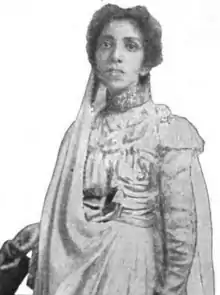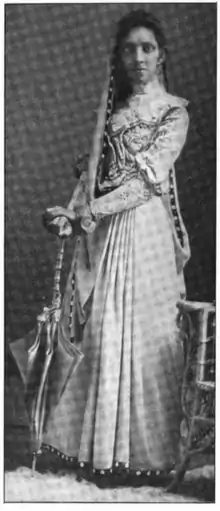

Susie Sorabji (1868 – 15 March 1931) was an Indian educator and Christian missionary.
Early life
Sorabji was born in Sholapur, Maharashtra,[1] one of the seven daughters of Reverend Sorabji Karsedji, a Parsi Christian missionary, and Francina Ford, a convert from Hinduism who had been adopted and raised by a British couple. Her mother established several girls' schools at Pune.[2] Susie Sorabji was educated at Bombay University.[3] Sorabji's sisters included law pioneer Cornelia Sorabji and physician Alice Maude Sorabji Pennell.
Career
Susie Sorabji followed her mother into educational work,[4] and (despite lifelong frail health) traveled widely, attending international conferences,[5] lecturing[6] and meeting with potential donors,[7] to raise awareness and funding for the girls' school in Pune.[3] "I am pleading for my sisters, the gentlest, meekest, most neglected in the civilized world," she declared of her cause.[8]
She started a kindergarten, and trained kindergarten teachers for work in other Indian schools. "I had to fight against the government inspector when I first started the kindergarten," she recalled, "but now the system has been made compulsory in the government schools."[2] She also did literacy and missionary work among Indian women living in zenana spaces.[9] She supported the temperance movement and Girl Guides of India,[10] and, along with other members of her family, opposed the Indian independence movement.[11]
Personal life
Susie Sorabji had chronic health issues, including vision problems which were treated with surgeries, medication, and extended periods of bandaging and rest.[12] Sorabji died in 1931, aged 63 years. Her sister Cornelia Sorabji wrote a biographical memoir, Susie Sorabji, Christian-Parsee Educationist of Western India: A Memoir (London: Oxford University Press 1932).[13] A street in Pune was named for Susie Sorabji in 1932.[12]
There is a Susie Sorabji Auditorium at St. Helena High School in Pune, named in her memory.[14] The school marks her death date (15 March) as its "Founder's Day", performing a play about her life and distributing food to local charity organizations.[15]
There is a chapter of the Imperial Order Daughters of the Empire in Uxbridge, Ontario, named for Susie Sorabji.[16]
References
- ↑ Eunice De Souza, Lindsay Pereira, eds., Women's Voices: Selections from Nineteenth and Early-Twentieth Century Indian Writing in English (Oxford University Press 2004): 95. ISBN 9780195667851
- 1 2 "A Group of Brilliant Women" The Westminster (24 June 1905): 17.
- 1 2 Delevan L. Pearson, "Some Modern Indian Idealists" The Chautauquan (October 1905): 149-152.
- ↑ "Hindoo Evangelist Speaks" Boston Post (30 September 1901): 6. via Newspapers.com

- ↑ Susie Sorabji, "Education of Women in India" New York Observer (10 August 1905): 186-188.
- ↑ Susie Sorabji, "A Vision of the Future Women of India" Life and Light for Woman (April 1914): 162.
- ↑ "Miss Gould's Gift to Miss Sorabji" New York Observer (11 January 1906): 36.
- ↑ Deborah Anna Logan, The Indian Ladies' Magazine, 1901–1938: From Raj to Swaraj (Rowman & Littlefield 2017): 155. ISBN 9781611462227
- ↑ Jessie A. Fowler, "A Mental Photograph of Miss Susie Sorabji, of India" The Phrenological Journal and Science of Health (October 1905): 312-317.
- ↑ "Castes Eliminated by Scout Growth in India" Evening News (8 April 1924): 13. via Newspapers.com

- ↑ Tim Allender, Learning Femininity in Colonial India, 1820-1932 (Oxford University Press 2016): 260. ISBN 9781784996987
- 1 2 Sorabji, Richard (2010). Opening Doors: The Untold Story of Cornelia Sorabji, Reformer, Lawyer and Champion of Women's Rights in India. Penguin Books India. ISBN 9781848853751.
- ↑ Cornelia Sorabji, Susie Sorabji, Christian-Parsee Educationist of Western India: A Memoir (Oxford University Press 1932).
- ↑ The Susie Sorabji Auditorium (St. Helena School) Pune, Venues, Eventful.com.
- ↑ "St Helena's High School Celebrates Founder's Day" Times of India (21 March 2011).
- ↑ "Uxbridge Pays Tribute to 75-year Organization" Durham Region (24 May 2009).